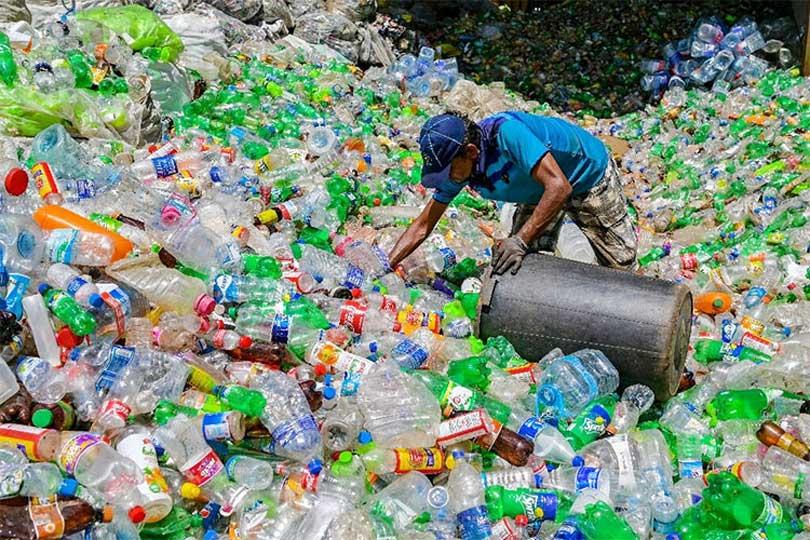Reply To:
Name - Reply Comment

By Nuzla Rizkiya
Sri Lanka is not an exception for plastic waste management which is a critical environmental challenge for the whole world. Significant threats have come up due to the increased generation of plastic waste and ineffective disposal practices. The main sectors affected are the terrestrial and marine ecosystems.
Understanding these problems, the European Union is joining hands with Sri Lanka to implement innovative strategies to minimize plastic waste generation and manage them better.
Sri Lanka imports over 500,000 metric tonnes (MT) of virgin plastic annually, a number that signifies the high demand for plastic products in the country. This high import rate, together with inadequate waste management systems, leads to the mismanagement of an estimated 1.59 million Tonnes of plastic waste each year. Surveys reveal that only 33% of it is collected, and a mere 3% is recycled on a national scale. Most of the waste ends up in canals, rivers, and eventually in the ocean, posing severe risks to marine life and ecosystems.
Therefore, the inefficiency in current waste management systems is apparent. The Small to medium enterprises (SMEs), which play a crucial role in waste collection and recycling, are facing numerous challenges. These include the high costs with regard to adopting advanced technologies needed to practice the imposed economic strategies and adhering to environmental guidelines.
However, the Sri Lankan government too has initiated measures to curb plastic pollution. A prime example is the Extended Producer Responsibility (EPR) scheme aimed at minimizing plastic use.
Initiatives by the EU for Sri Lanka aims at more sustainable and innovative plastic waste minimization and management systems. According to the union, Sri Lanka can achieve this by integrating SMEs into greener value and supply chains. They shortlist the following strategies.
By improving usage of resources, fostering national innovation and providing green financing, initiatives can boost economic development, especially in the commercial western provinces.
2. Promoting circular economy practices
The initiative funded by the EU seeks to increase the capacity of value chain actors to contribute to a circular economy. This includes providing increased access to green financial products and schemes for start-ups and SMEs.
3. Strengthening frameworks
Developing robust frameworks for business concepts such as traceability, transparency, and compliance in plastic waste management will help SMEs adopt sustainable and innovative plastic minimization and management practices.
4. Encouraging stakeholder collaboration
Leveraging collective knowledge, skills, and experience of partners and stakeholders to foster a collaborative approach to plastic waste management.
To achieve its objectives, the EU initiatives in Sri Lanka focuses on several key areas
· Upgrading technical skills and resources for SMEs
Enhancing the technical capabilities and addressing resource gaps among SMEs will empower them to adopt sustainable practices and technologies for plastic waste management.
· Improving connectivity and awareness
By encouraging better networking among stakeholders and raising awareness about the economic potential of recycling and upcycling, EU initiatives aim to create a more collaborative and informed effort.
· Increasing access to green financing
Increasing the opportunities for SMEs to access start-up capital and green financial products will enable them to invest in sustainable initiatives and technologies.
· Strengthening involvement and representation in policies
By ensuring that stakeholders and recyclers have a stronger voice in policy discussions and their inputs considered, the country can formulate more effective regulations and standards.
· Imposing regulations and managing data on plastic more effectively
By encouraging the enforcement of existing regulations and improving the traceability and transparency of plastic waste throughout its life cycle will support better management practices.
The EU-supported initiatives in countries generally align with the goals of the European Green Deal 2019 and the EU Circular Economy Action Plan 2020. Therefore, by promoting circular economy strategies, they try address two key policy areas of the Green Deal. They are
a. Eliminating pollution
Keeping water streams clean and preserving biodiversity in lakes, rivers, and wetlands by minimizing plastic waste leakage into these environments.
b. Supporting sustainable product policies:
Encouraging circular designs and reducing waste, particularly in resourceful sectors such as the textile industry to create more sustainable products.
Furthermore, the initiatives support the EU Plastics Strategy 2018 by advocating for circular business models and strategies that minimize plastic use. It also complements the EU Green Deal Investment Plan 2019 by involving EU-based financial institutions to promote private and public investments in green initiatives.
Addressing Sri Lanka’s overall challenge in plastic waste
Addressing the plastic waste crisis in Sri Lanka requires a multi-phased approach that involves all stakeholders including government bodies and SMEs to local communities and international partners. Therefore, efforts should offer a comprehensive strategy to tackle the challenge by integrating sustainable practices into the plastic value and supply chains. By enhancing resource efficiency, promoting circular economy principles, and strengthening regulatory frameworks Sri Lanka can create a more sustainable and prosperous future.